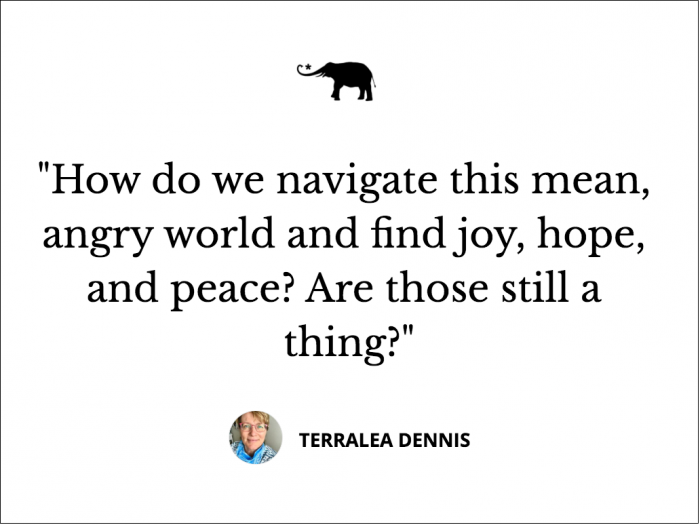~
In one of the first episodes of “Ted Lasso,” Coach Lasso takes aside a despondent player who just missed a great shot and says, “Do you know what the happiest animal is?”
The player looks perplexed. “No,” he replies.
The coach then says, “The goldfish. Wanna know why?” The player stares at him. The coach smiles, “Cuz goldfish have a 10-second memory,” he winks, leans in, and pats the player’s shoulder. “Be a goldfish.”
The player stands there, nonplussed. But the coach just pats him and says, “Yeah, he’ll get it.” The coach keeps smiling, as he does throughout this Emmy-nominated series, weaving comedy, yearning, kindness, and heartbreak into my new favorite show.
The main character, Ted Lasso, is set up to fail. He is doing an impossible job, being asked to coach a B-league soccer team in England, when all he has ever coached or played, for that matter, is American junior college-level football.
He isn’t dull or incompetent; he is bravely making a choice to keep his positive outlook. This is no Pollyanna; this is a brave man who is humiliated publicly over and over and over, who could easily slide into murderous mayhem, and whom we might have expected a snap to violence. But it doesn’t happen. And while you might think this is a recipe for pablum—a boring show about boring, smiley caricatures, it grows on you slowly, choice by brave choice.
In Ted Lasso’s hate-filled world, he resists, but not with stubbornness, meanness, or by reigning down revenge (like one character does). He resists with kindness toward himself, others, friends, and enemies.
Ted shows us the real toll this ever-present-kindness-in-the-face-of-hate takes on his soul. We see just how deep his bravery goes and how much he must find the support of others to keep navigating the raging rivers of his world where all the rocks are stacked in his path and his oar is broken.
“Be a goldfish,” the same player later tells others. Those words caught me. Maybe they will catch you too.
Life right now seems like an impossible job in real life. I am so bone-tired, how are you holding up?
Tired of wishing everyone would just do the kind thing, say the right thing, get together, and stop hating and judging? Whew! Life now, in the second half of 2021, is an angry river, and with this second wave or 12th wave of COVID-19, who can keep track anymore?
We need help, support, and a kind shoulder to lean on. How do we navigate this mean, angry world and find joy, hope, and peace? Are those still a thing?
The good news is, what resistance fighters during World War 2 knew, which is also what every activist against hate and division throughout history knew: we are more resilient than we know.
Let that deep historical truth sink into your bones.
They whisper to us, “We were born for this time, and the resilience and kindness we can stitch together will be, can be, must be powerful.”
Please forgive my not giving credit. A wise writer once wrote that kindness is an act of resistance. So how do we become like that goldfish when everything around us is sh*t that hits the fan and just keeps flying, and it gets sh*ttier every day?
We are all living in 24/7 fight-or-flight mode. Our stress-responding sympathetic nervous system is on high alert. We may look like we are moving through our lives with some degree of normalcy, but maybe we find ourselves multitasking into brain oblivion, tossing and turning at night. Our healthy habits are becoming obsessive, we might snap at our children out of the blue, scroll Instagram/YouTube/TikTok for hours, or maybe just never put the phone down, share dog-dancing videos late into the night, (this is sounding very personal isn’t it?)
But a little forgiveness for me and you, please.
We participate in whatever addictive patterns help us avoid dealing with life because our survival brain says so. When we are stressed, we can’t help but listen to this ancient animal brain. It has been doing that survival thing for millennia. It takes a commitment to be a goldfish—to let go, let go, and then let go again. It takes determination to come back to what Pema Chödrön writes is our warrior commitment.
She writes,
“It is only to the degree that we become willing to face our own feelings that we can really help others. So we make a commitment that for the rest of our lives, we’ll train in freeing ourselves form the tyranny of our own reactivity, our own survival mechanisms, our own propensities to be hooked.”
So I acknowledge my many triggers, stay present with my own discomfort, return to my commitment to my values, and develop my friendliness toward myself. No judging. I just keep pivoting like the wise goldfish, breathing big bubbles and letting go.
What I do want to remember is that humans developed a fabulous frontal brain, the prefrontal cortex, which is designed for insight, creativity, compassion, resilience, confidence, and hope. Bring your fingers to your forehead and gently rest there. Know that this is the human brain that built Martin Luther King, Desmond Tutu, Mother Teresa, and add your favorite activists to the list.
Awareness is the first step. I want my thinking brain, full of compassion, creativity, and drive to be in charge.
Our stress response brain has a negativity bias. It is a survival instinct with a good intention to remember the bad things that happened so we can respond differently. But we are charting new, scary waters every day, aren’t we? Raise your hand if you survived a global pandemic at some other time in your life? A global climate crisis? Anyone?
Okay. So instead of flapping fins in place, gasping, and twirling in the murky deep, I can choose to breathe, return to my vision and values, resist the urge to hang out in the muddy waters of blame, shame, victimhood, and ask myself a question or two about what I am actually feeling.
“Thanks for asking. I’m feeling desperate because the world is ending.”
The next question for my inner self is: “Is that absolutely true?”
A pause.
Letting my own sweet goodness deeply assess my feelings, I find fears, sadness, grief, anger, and a little shame hiding down there. Okay.
Pema writes that we will be triggered again. We will fall into self-judgment and anger again, but we can bring awareness to that with these simple goldfish steps:
1. Come into the present moment.
Quick and gentle, notice what’s happening with you right now. Avoid the narrative if possible. Rest in the sensation.
2. Place your hands on your heart.
For a little self-care, come home, take a lovely big breath, and lift your eyebrows. Try it and see what happens. This simple movement quickly brings us out of our survival brain and resets our fears for a moment.
It is a moment of acceptance. We can’t love what we don’t first accept and respect.
3. Say those words in your mind.
To deepen that acceptance, say, “This is my experience right now, and it is okay. I am safe in this moment.” Then breathe.
We can swim into clear waters of our authentic, true selves where we don’t have to create or maintain empathy. It just naturally lives there in the water where we are all goldfish, breathing together, choosing to keep swimming, and letting go of our attachment to the “yuck” every 10 seconds or so.
And where we remember that we are swirling around in the reverie and ecstasy of our own loving, warrior lives.







Read 0 comments and reply